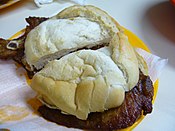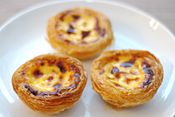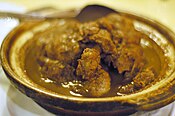Macanese cuisine
This article needs additional citations for verification. (November 2016) |
| Part of a series on the |
| Culture of Macau |
|---|
 |
| History |
| Languages |
| Cuisine |
| Religion |
| Sport |
Macanese cuisine (Chinese: 澳門土生葡菜, Portuguese: culinária macaense) is mainly influenced by Cantonese cuisine, Portuguese cuisine, and influences from Southeast Asia and the Lusophone world, due to Macau's past as a Portuguese colony and long history of being an international gambing centre known for its vibrant hospitality and tourism industry. Minichi, egg tarts, pork chop buns, ginger milk and almond cakes are some of the region's most common delicacies. Common cooking methods make use of various spices such as turmeric, coconut milk, and cinnamon to give dishes an extra kick of aroma and enhancement of taste. However, many routinely consumed dishes in Macau belong to a subclass (Heungshan) of Cantonese cuisine.[citation needed] Many Macanese dishes resulted from the spice blends that the wives of Portuguese sailors used in an attempt to replicate European dishes. Besides local Chinese ingredients and seasonings, Macanese dishes also include those from Europe, Latin America, Africa, India, and Southeast Asia. Genuine Portuguese and Spanish cuisine can also be found in Macau. Common cooking techniques include baking, grilling, and roasting; the former is seldom seen in other styles of Chinese cooking.
Typically, Macanese food is seasoned with various spices including turmeric, coconut milk, and cinnamon, and dried cod (bacalhau), giving special aromas and tastes. Popular dishes include galinha à Portuguesa, galinha à Africana (African chicken), bacalhau (traditional Portuguese salt cod),[1] pato de cabidela, Macanese chili shrimps, minchi,[2][3][4] stir-fried curry crab; pig's ear and papaya salad, and rabbit stewed in wine, cinnamon and star anise. Tapas are also an important part of Macanese cuisine.[citation needed]
The most popular dessert is pastéis de nata (egg tarts).[citation needed] Other popular desserts and snacks such as ginger milk, pork chop bun, and almond cake are generally considered Macau cuisine rather than Macanese cuisine because they are either originated from Zhongshan and Zhuhai or considered not exotic/Portuguese enough.[further explanation needed]
Cha Gordo (literally "Fat Tea"[5]) is a culinary tradition amongst the Macanese community in Macau that is likened to afternoon tea.[5] Historically, families with Portuguese heritage in Macau would host a Cha Gordo for a number of occasions, including Catholic holidays, christening, or birthdays, but they can be held for any reason.[6] Historically, some families would even host one on a weekly basis.[5] A Cha Gordo would take place following a Macanese wedding, instead of the elaborate banquet seen in Chinese weddings.[7]
Famous restaurants of Macau include the Restaurante Riqueixo, Porto Interior, Restaurante Litoral, Restaurante Espao and Restaurante O Santos.[citation needed]
Macanese dishes and desserts[]
Galinha à Africana

Galinha à Portuguesa
Pastéis de nata
Pato de cabidela

Minchi
Non-Macanese Macau snacks[]

Pork chop bun
Apricot kernel biscuit

The Macau ginger milk curd resembles this Hong Kong ginger milk curd.
See also[]
- Cantonese cuisine
- History of Macau
- Hong Kong cuisine
- List of Chinese dishes
Select bibliography[]
- Ferreira Lamas, João António (1995). A culinária dos macaenses. Oporto: Lello & Irmão.
- Gomes, Maria Margarida (1984). A cozinha macaense. Macau: Imprensa Nacional.
- Senna, Maria Celestina de Mello e (1998). Cozinha de Macau. Lisbon: Vega ISBN 972-699-575-2
References[]
- ^ SILVA, A. J. M. (2015), The fable of the cod and the promised sea. About portuguese traditions of bacalhau, in BARATA, F. T- and ROCHA, J. M. (eds.), Heritages and Memories from the Sea, Proceedings of the 1st International Conference of the UNESCO Chair in Intangible Heritage and Traditional Know-How: Linking Heritage, 14–16 January 2015. University of Evora, Évora, pp. 130-143. PDF version
- ^ "Archived copy". Archived from the original on 2011-10-02. Retrieved 2010-06-22.CS1 maint: archived copy as title (link)
- ^ "Archived copy" (PDF). Archived from the original (PDF) on 2010-05-29. Retrieved 2010-06-22.CS1 maint: archived copy as title (link)
- ^ "Archived copy". Archived from the original on 2012-06-30. Retrieved 2010-06-22.CS1 maint: archived copy as title (link)
- ^ Jump up to: a b c Cummings-Yeates, Rosalind (18 August 2015). "Feasting on Fat Tea in Macau". TravelPulse.
- ^ Loh, Juliana (10 April 2015). "Cha Gordo: Macau's ' fat tea' a celebration of Macanese cuisine and culture". South China Morning Post. Retrieved 7 March 2018.
- ^ Daniels, Maggie; Loveless, Carrie (2014). Wedding Planning and Management: Consultancy for Diverse Clients (Second ed.). Routledge. p. 29. Retrieved 7 March 2018.
External links[]
- Macanese cuisine
- Cantonese cuisine
- Chinese cuisine
- Portuguese cuisine








